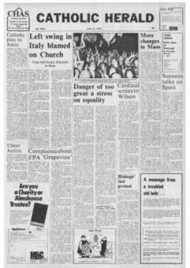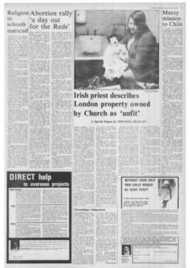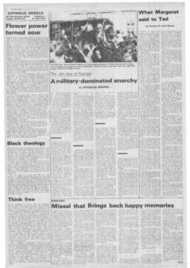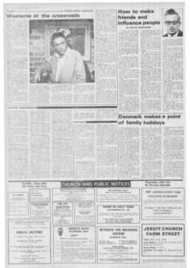Page 5, 27th June 1975
Page 5
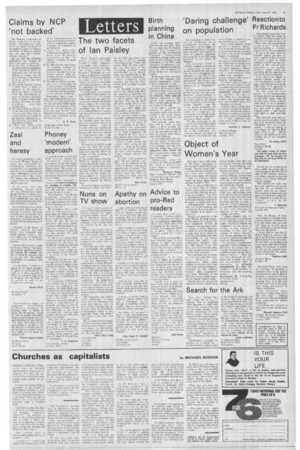
Report an error
Noticed an error on this page?If you've noticed an error in this article please click here to report it.
Tags
Share
Related articles
Faith Helped
Pressures On Women
Happy Helpmates
A Catholic Nun And Rabbi Julia Neuberger Engaged In A...
Women And Priests
Object of Women's Year
Although I agree with many of the views expressed in Joanna Nash's article of June 13 headed "Year of women's glib". I feel that she has confused certain issues and overlooked others, particularly with regard to what the Catholic Church should be doing about International Women's Year.
First. the object of the Year is by no means that of women "setting apart a year to see how they can help alleviate the suffering of humanity." The Year is intended precisely to focus on women as suffering members of humanity by urging each of us — male and female — to realise what kind of patronisation and exploitation of women still exists, whether it be explicit or otherwise.
Though the questions of the Third World, of world hunger, of the oppression of people by their neighbours, of war, all continue to be important issues — indeed, as Joanna Nash has pointed out, to be far more important than those raised by some Western fanatics and rigid subscribers to the broad Women's Lib "ethic" — the International Women's Year has little enough to do with them, as it is an event that seeks to open people's eyes to issues that are quite different.
Over-reaction has occurred, as it will, not only from hard line Women's Lib organisations, which would continue to act the same, Year or no Year, but from people ex emplified by the "elderly women's rights campaigner" end those members of the WCC who think it vitally important to change English usage.
But this does not change the objectives towards which many serious people, both men and women, arc working in the field of new understanding and mutual respect and support between the sexes.
With regard to the role of the Catholic Church, Joanna Nash suggests very little, seeming to think that if the great women saints would not have bothered, nor should the Church.
Quite aside from other aspects of these and other saints' lives and writings (such as St Therese of Lisieux wishing fervently to be a priest; St Joan of Arc defying the French hierarchy precisely in order to obey her "voices"), there has so far been little sign in the Church of any new theological approach to the "role" and "calling" of women.
I cannot imagine that this would be wrong — or irrelevant to the suffering people of the world — if it led to a renewal and reappraisal of the place of women in the Church's apostolate in line with the message of radical liberation and change preached by Our Lord and achieved through His death and Resurrection.
For example, a fundamental approach to the theological implications of saying that a woman is by her own nature incapable of receiving the Sacrament, of Orders — whic" has not been attempted for centuries and certainly not since the Aristotelian idea of femininity as privatio masculinitatis has been discarded — could produce interesting and far-reaching results.
Rosamund M. Calverley 10 Victoria Road,
Sum mertown, Oxford.
blog comments powered by Disqus


